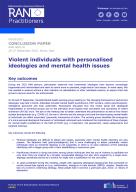Details
- Publication date
- 30 November 2022
- Author
- Directorate-General for Migration and Home Affairs
- Country
- Italy
- RAN Publications Topic
- Mental health issues
Description
During the 2021 RAN plenary, participants observed that (extremist) ideologies have become increasingly fragmented and individualised and seem to centre more on personal, single and/or local issues. In some cases, this has resulted in violence without a clear indication of radicalisation or other noticeable reasons, an aspect which has proved a serious issue for law enforcement.
On 26 and 27 September, the RAN Mental Health working group meeting on ‘the changing frameworks of (extremist) ideologies’ was held in Rome. Attendees included mental health practitioners, EXIT workers, police (psychologists), intelligence personnel and local authorities. Participants discussed how this recent social and ideological fragmentation in extremist groups and on the individual level impacts their prevention and countering of violent extremism (P/CVE) work.
The aim of the meeting was to better understand this phenomenon as well as how recent societal developments (e.g. COVID-19, the war in Ukraine and the energy crisis) and the deteriorating mental health of individuals can affect extremists’ (personal) frameworks of action. The working group identified the emergence of a more personal ideological framework of radicalised individuals and considered the implications of these changes for mental health practitioners in the field of P/CVE (e.g. in treatment, risk assessment, needs assessments and targeted training).
Key outcomes include the following.
- Personal ideologies are difficult to detect and assess, especially when mental health disorders are also present. The detection field (police/intelligence) find it more challenging to detect potentially violent individuals when an extremist ideology is not suspected, or there is no clear indication of the individual identifying with a bigger group with a clear destabilising or subversive goal.
- Practitioners observe a rising conviction among certain individuals that the use of violence is justifiable not only when they are inspired by a broader recognisable ideology but also when angered by a single issue. Ideology sometimes serves as a conduit for anger and a justification for the conviction.
- In cases presented during the meeting, people with opposing ideological backgrounds had connected on certain issues they agreed on (e.g. antisemitism, misogyny or hate towards LGBTQ+ people). Despite the lack of a common underlying ideology, these people had in common a particular goal, driver, or means of expression.
This paper summarises the main conclusions following the discussion on this observed fragmentation of ideologies. It describes the phenomenon and its complexity, as well as the ensuing challenges that practitioners currently face. It then puts forward recommendations for risk assessment, therapy and care infrastructure and policy. Lastly, it presents follow-up ideas.

